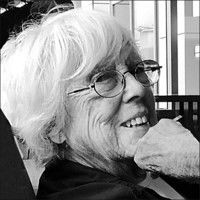Retired Boston College School of Social Work faculty member Nancy W. Veeder, whose research included marketing human services in the managed care market and an in-depth study of women’s decision-making processes, died on June 1. She was 81.
Visiting hours for Dr. Veeder will be held Tuesday, June 5, from 5-7 p.m. at Eaton & Mackay Funeral Home, 465 Centre Street in Newton.

Dr. Veeder, an associate professor who taught at BCSSW for 40 years, cited the pioneering Chicago social worker Jane Addams as an inspiration for her teaching. Friends and colleagues described Dr. Veeder as deeply committed to social justice, but with a strong belief that social work should be guided by a rational approach to implementation and review of results.
This clear-eyed outlook was evident in her 1999 book, Marketing Human Services: Selling Your Services Under Managed Care, which she called a “desktop reference” for applying marketing practices like fundraising, target-segmenting and focus groups to the social work profession.
In an interview with the Boston College Chronicle, Dr. Veeder explained that social workers and other human services professionals tended to be reluctant in adopting for-profit management practices or even to consider their vocation in such a context – attitudes she said were counter-productive in the managed care environment.
“For better or worse, human services has become a business,” said Dr. Veeder, who held an MBA from the Carroll School of Management. “What I’m saying is, let’s beat the suits at their own game and do good for our clients.”
One of her major accomplishments was an extensive intergenerational study of 100 Northern Irish women to analyze how women make decisions in society and their personal lives. Supported by a BC faculty research grant, Dr. Veeder undertook the project through the University of Ulster School of Social Work.
Dr. Veeder published her findings in a 1992 book, Women’s Decision-Making: Common Themes, Irish Voices, which stated that women take more factors into consideration, plan ahead and are more likely to consider the consequences of a decision; women also place a greater emphasis on relationships, are more flexible and are willing to admit their mistakes, she said.
“Women’s decision-making has not really been studied – or when it has, it’s usually in relation to men,” said Dr. Veeder in an interview with BC student newspaper The Heights. “In such cases, women appear wishy-washy, ambivalent and vacillating, not because they actually are but because they are not in society positions like men.”
This difference in societal roles defines the way men think and make decisions, she explained – society is more accepting of “on-the-spot decision-making because that is how men approach decisions.”
Dr. Veeder told The Heights that men and women should recognize such sex-based differences and talk about them: “We have to begin seeing things in less polar terms – to talk across genders and to listen to each other.”
During her career at BC, Dr. Veeder was active in helping establish the Lesbian and Gay Faculty, Staff and Administrators Association of Boston College, serving on its steering committee. The association is among the Boston College Affinity Groups organized through the University’s Office for Institutional Diversity.
She retired in 2008.
Dr. Veeder graduated from Smith College and went on to earn her MSW from Simmons College and doctorate from the Brandeis University Heller School.
The daughter of the late Harold and Alice Veeder, she is survived by her partner of 20 years, Mary Costanza, and her adoptive family, Susan English and Francis Martinez and their daughter Katherine.
A celebration of Dr. Veeder’s life is planned at a later date.
In lieu of flowers, donations may be sent to Rosie's Place, 889 Harrison Ave, Boston, MA 02118.
Sean Smith | University Communications | June 4, 2018




